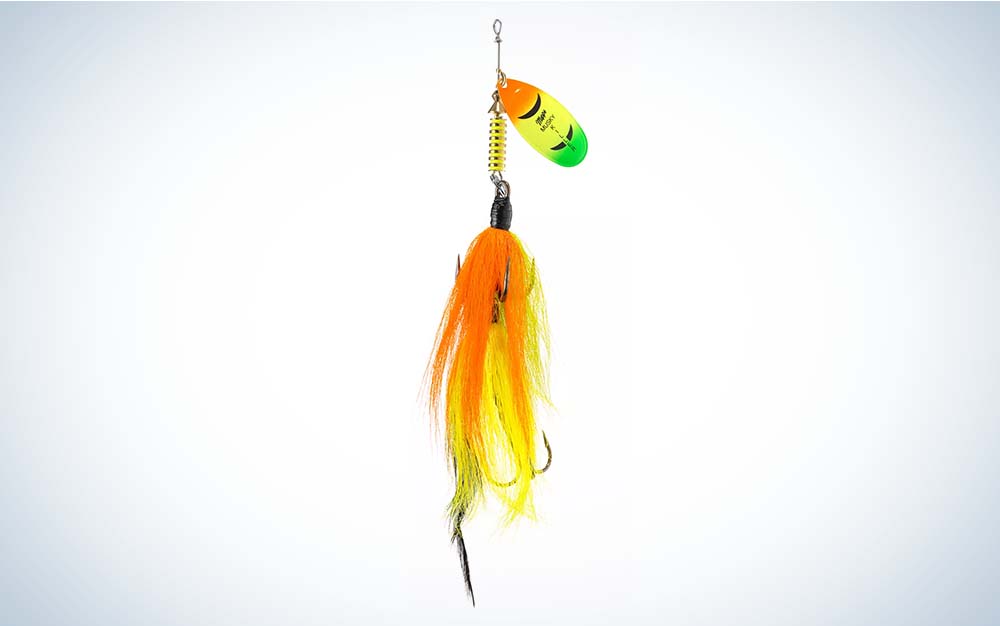We may earn revenue from the products available on this page and participate in affiliate programs. Learn More ›
Updated Mar 10, 2023 5:44 PM
Most anglers don’t know what to think when they walk into a musky shop and are greeted with rows upon rows of strange-looking lures ranging in size, shape, and color. From massive rubber swimmers with multiple tails, to what look like bass jigs on steroids, musky baits are fascinating. A passionate angler can spend a lot of time and money in a tackle shop and still not select the correct lures.
How I Chose the Best Musky Lures
I’ve put in well over the prerequisite 1,000 casts to catch musky and I’ve learned what lures consistently produce. I chose lures that work throughout the year and in variety of water depths, so that no matter where you’re fishing, there’s a lure that will work.
I’ve been fishing for muskies for many years and have narrowed down the list of best musky lures to these models. Here’s why you should have them in your tackle box—and when and how to use them.
Key Features
- Length: 10 or 12 inches
- Weight: 6.4 and 8.8 ounces
- Colors: Large variety offered
Why it Made the Cut
This is a user-friendly bait that works anytime of year. You can’t go wrong throwing the Chaos Tackle Posseidon.
Pros
- Easy to fish
- Pre rigged
- Versatile
Cons
This big paddle tail has the full body wobble of a crankbait, but the head almost moves independently from the large paddle tail, which gives the bait a one-of-a-kind action. It’s particularly user-friendly for new musky anglers because for the most part, you’re fishing this bait with a straight retrieve. Occasionally, I will do a quick burn and pause so the bait darts to the side, often triggering aggressive bites. This bait allows anglers to fish various depths, as it can be quick-retrieved in the shallows, or slow rolled in deeper water. It can be trolled or cast.
The Posseidon is effective year-round, but this is one of the best fall musky lures. The fish are typically feeding big late fall into winter, and the Posseidon is ideal for that time period. My go-to colors include White, Sucker, Custom Eel Pout, Custom Jays Fire Perch, Clown, and Hot Perch.
Key Features
- Length: 9 and 17 inches
- Weight: 3.2 or 13.5 ounces
- Colors: Large variety
Why it Made the Cut
If you want to catch a musky, you should have a Medussa in your box. It’s a versatile bait that comes in several sizes, and it catches fish everywhere.
Pros
- Lots of vibration
- Versatile
Cons
The Medussa is a versatile rubber bait that has put big muskies in the net all across the country. I prefer this bait over a lot of other big rubber lures because of the variety of ways you can fish it. I’ve had success ripping this bait out of grass, popping it out deep, sweeping it, straight-retrieving it, and slow-rolling it. The triple tail on this bait gives it lots of life and vibration to get the fish’s attention and commitment.
The Medussa is offered in eight different sizes, from the mini Medussa to the monster Medussa for the extra big appetite.
My top patterns are Black and Orange, Lemontail, White, Sucker, Custom Fire Walleye, FireTiger, and Cisco. With the good size variety, you can fish this bait year round. I have had my best success in the fall.
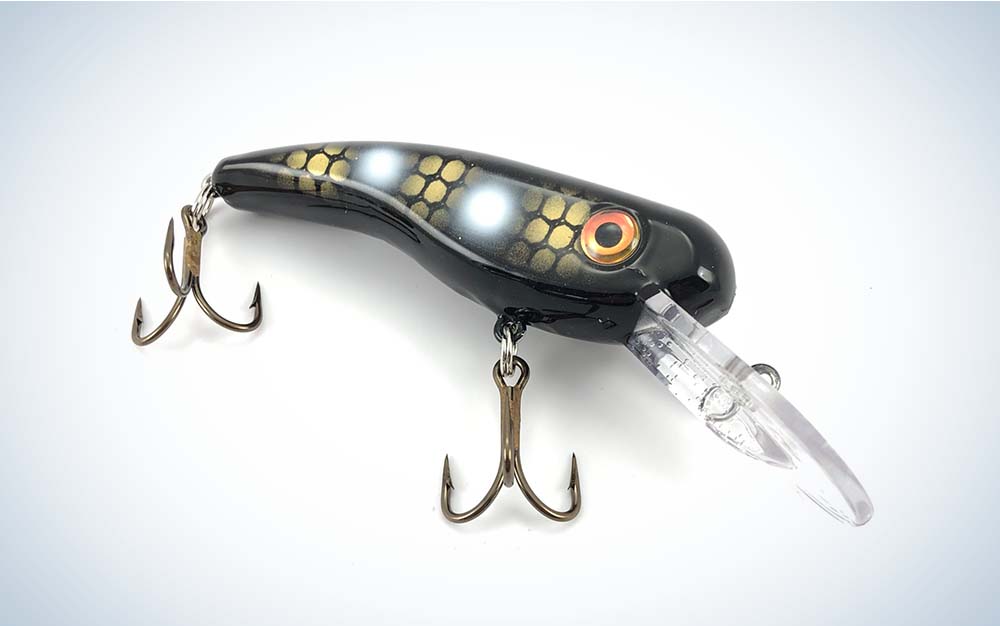
Key Features
- Length: 5.25 inches
- Weight: 1 ounce
- 20 color patterns
Why it Made the Cut
If you want to cover a ton of water in a day, trolling is the best way to do it and the .22 Short is one of the best trolling lures for musky. It can also be casted which adds to it’s versatility and effectiveness.
Pros
- Good size for getting bites
- Runs 6- to 16-feet deep
Cons
- Not weedless
- Can catch non-target species
This small crankbait is arguably one of the best cranks on the market for muskies. It is one of the best musky crankbait if you want to use your trolling motor to cover water, but is also effective casting. When muskies are relating to laydowns or rock piles, aggressively bumping this bait against the cover and picking apart the structure is a great way to put fish in the boat. This bait has a unique wobble and is the perfect “snack” size to get these fish to eat. They also offer this crank in a square bill and a .22 long size to give anglers more of a size and depth variety.
This crank can be fished year-round, but I find it really shines in the early spring into summer when fish are eating a little smaller bait and up shallow. My go-to color patterns are Brushed Perch, Walleye 2.0, Lemonhead, Black Perch, and Canadian Crush.
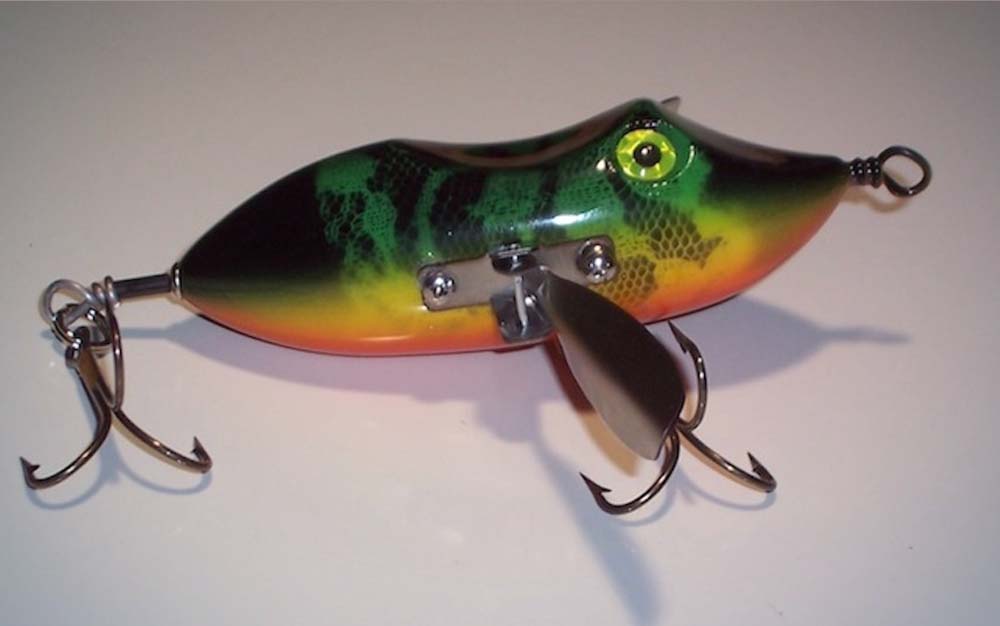
Key Features
- Length: 5.5 inches
- Weight: 2.7 ounces
- Five color patterns
Why it Made the Cut
This topwater won’t tire you out and consistently puts fish in the boat.
Pros
- Unique sound
- Excellent walking action
Cons
A lot of anglers throw prop-style topwaters, this slower paced creeper offers a different sound that muskies often can’t resist. The Bitten Tackle Creeper is very simple to fish, and anglers don’t tire as much fishing this bait because it requires a much slower retrieve. Because you can fish it slowly, it gives those long clackers extra time to do their job of slowly driving the fish mad enough to eat. It’s one of the best musky surface lures you can fish.
Topwater baits typically shine for me from late spring to early fall, when water temps are at least 60 degrees. I’ve had luck fishing these all day on overcast days, but are great dawn and dusk baits for all conditions. I stick with the black/orange and duck patterns.
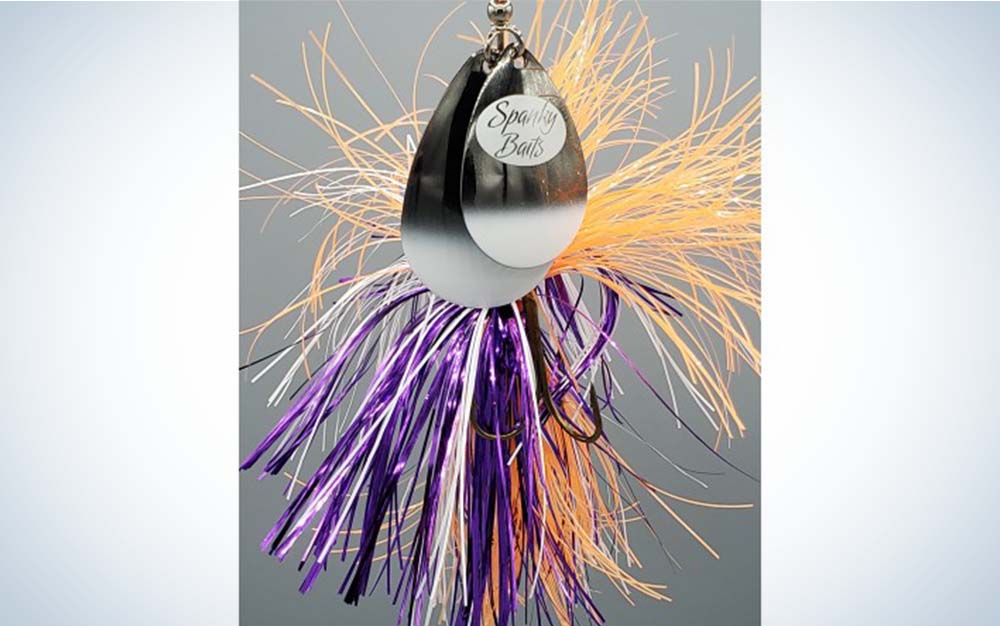
Key Features
- Length: 8 inches
- Weight: 2.6 ounces
- Large color selection
Why it Made the Cut
This is a great bait for covering water with an easy straight retrieve.
Pros
- Easy to fish
- Lots of vibration
Cons
The best Bucktails come in many different configurations, but this Spanky Baits 89 has always been a favorite. It features one mag 8 blade and one Colorado size 8 blade to give this bait that staggered vibration that fish don’t see every day. It is one of the most effective search baits when you’re trying to eliminate water, and though burning blades can get tiring, this one is user friendly as it’s a typical straight retrieve. I will often add a big grub tail to this bait to give it just a bit more life.
As far as colors, I like Napalm Perch, Black Smoke, Black Flo Green, Black/Gold Smoke, and Bluegill. You can fish blades year-round and catch fish on them even in frigid cold temps, but I have found that they have worked best when water temps are from the mid 60s to the low 70s.
Key Features
- Length: 7 ½ inches
- Weight: ¾ ounce
- Large color selection
Why it Made the Cut
When the muskies are being especially tight lipped, try downsizing to the Musky Killer.
Pros
- Good hook-up ratio
- Proven design
- Smaller blades won’t tire you out
Cons
- Not as much vibration as bigger bladed bucktails
When muskies are following but won’t commit, sometimes it pays to downsize. This Musky Mepps bucktail has been a tried and true, proven fish catcher for decades. It features a small, single blade that allows anglers to burn this bucktail quickly without fatiguing, or it can be fished slow. The 5/0 single treble hook boasts an excellent hook up ratio.
I like to keep it simple with colors, as Red/Silver, Black/Silver, Yellow/Black, and Silver/Brown can get the job done in about any environment. One of the things that really makes this small bucktail work is the ability to ramp up the retrieval speed, triggering fish to bite.
Things to Consider When Shopping for Musky Lures
Many musky lures are big, but anglers will sometimes overthink size. You don’t always have to go big to get bit big. I always try to match the forage when it comes to size and color. If the muskies are feeding on schools of small perch or crappie, I will grab a small crankbait or a small bladed bait, depending on the depth of the fish and the vegetation.
When it comes to the time of year, there are always guidelines to follow as far as what baits work best in the spring versus in the fall. But nothing is absolute in fishing, and it pays to experiment. I’ve thrown blades in the winter and caught some of my biggest fish, just as I’ve thrown big rubber in the spring and have been handsomely rewarded. If something isn’t working and you’re in an area you know holds fish, change it up. Try the same bait, but fish it and retrieve it differently, or change baits all together.
READ NEXT: Fish of 10,000 Casts: Why Muskies Are So Hard to Catch
FAQs
Not sure where to begin? We’ve answered some of the top musky questions.
Q: How do you catch a musky in the summer?
Things can really “heat up” in the summer, including the musky action. Muskies will seek out cooler water and can lurk around deep cabbage lines and offshore humps and points that are close to deep water. In rivers, muskies will take refuge in the deep, cooler troughs or they will move up spring fed creeks. Keep a close eye on water temps, as it’s a good rule to lay off targeting them when temps exceed 75 degrees, due to high mortality rates.
Q: How rare is it to catch a musky?
They are known as the “fish of 10000 casts,” but some lucky anglers have caught multiple fish on their first outing. Most anglers consider having just one “interaction” with a fish, whether this be an eat or a follow, to be a normal day. Time of day, moon phase, conditions, and location can all factor in when it comes to having success. However, the more time you spend on the water learning their habits, the better musky angler you become.
Q: Do muskies hit top water?
Does the sun rise? Just like most freshwater predators, a musky will absolutely eat top water. There are definitely more productive times of the year and time of day to throw top water, but one should never outrule a big plopper, prop or walking style top water bait. Good areas to throw top waters include shallow weedy bays, around laydowns and shorelines, shallow bars, and even offshore if you see muskies feeding on suspended bait.
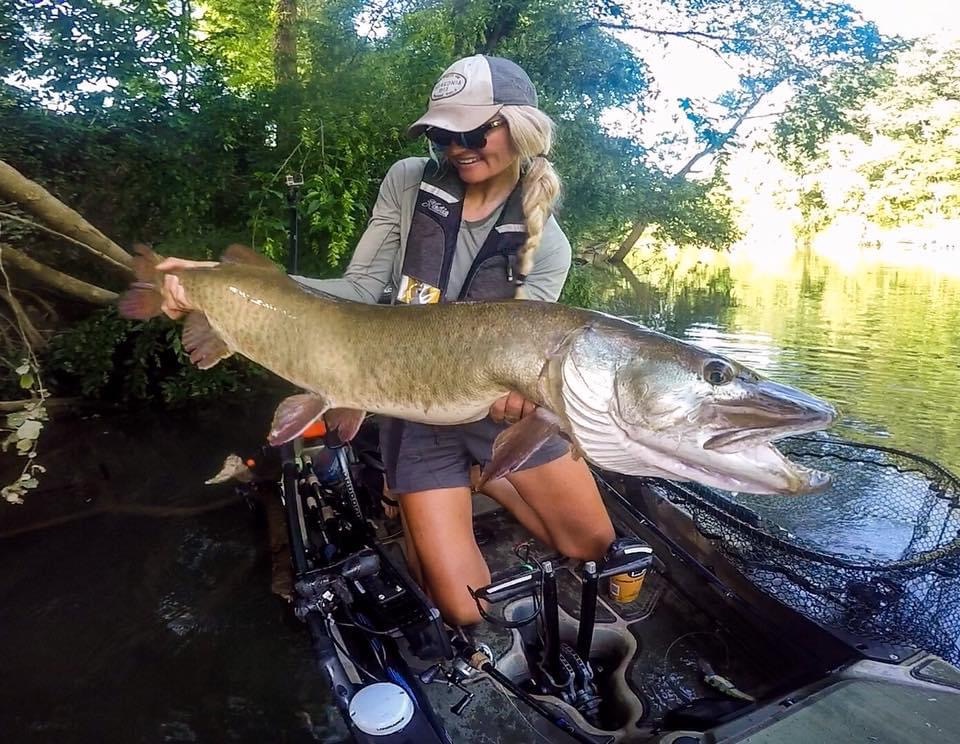
Final Thoughts
Whatever musky lure you go with, keep casting. They call muskies the fish of 1,000 casts for a reason, and it’s all too easy to get discouraged chasing these elusive predators. It’s no secret that anglers who have the most success are the ones who spend the most time on the water. Fish can be caught on post frontal days and outside of the major or minor moon phases. Anglers just have to discipline themselves to stay focused—and keep chucking and winding.
Why Trust Outdoor Life
Since 1898, OL has been a leading authority in testing and reviewing hunting gear, fishing tackle, guns and shooting equipment, and much more. We have more than a century-long history of evaluating products, and we’re now bringing that expertise to online reviews. Our editors are experienced outdoorsmen and women, and most importantly, we’re trained journalists. We prioritize field testing and objective data when reviewing products. We conduct interviews with gear manufacturers and engineers as well as outdoor experts so that our readers have an understanding of how and why a product works—or doesn’t.
Advertising does not influence our gear reviews and it never will. While we always focus our coverage on standout products—because we want our readers to be aware of the latest and greatest gear—we also cover the flaws and quirks of any given product.


